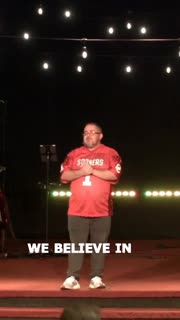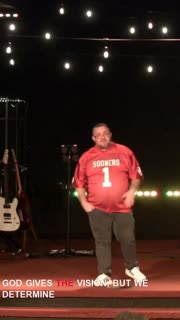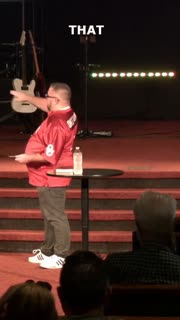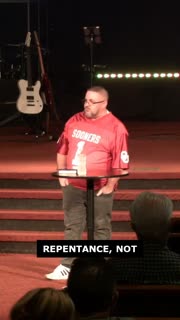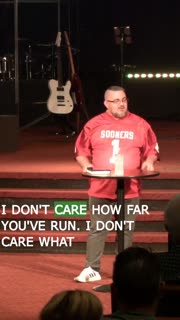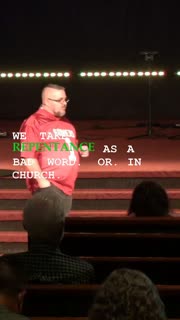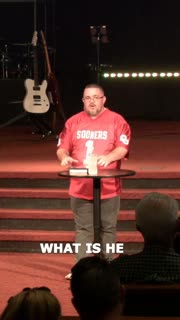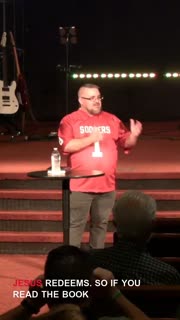Ruth: A Journey of Redemption and Repentance
Devotional
Sermon Summary
Bible Study Guide
Sermon Clips
1. "We believe in the next generation. That's why we did the outreach yesterday. That's why Pastor Caleb, Pastor Sean do everything that they do throughout the week. We believe in the next generation. And as we do, we have plans and we have visions. And to build right over here a legacy center that's going to be a state-of-the-art, amazing complex for our kids and our teens. And so we're asking you to consider maybe what God would speak to you." [30:35] (31 seconds)
2. "God gives the vision, but we determine the pace. Come on. Come on. What we do with that vision determines how quickly we get to it or how slowly we get to it. Come on. So we get to determine the pace of the vision. So the vision is a legacy center. We believe in the next generation, and we are pushing towards that. And as you give towards that, it just brings us closer and closer to that." [31:24] (27 seconds)
3. "We understand that all Scripture... Everybody say all. All Scripture is breathed out by God and profitable for teaching, for reproof, for correction, for training in righteousness. So, we understand that every word of this book, is God-breathed. The theological term for that is it is come under inspiration. Okay? It was inspired by God. It was God-breathed for us." [39:58] (32 seconds)
4. "God responds to repentance, not retreat. Turning to God and repenting. And we'll talk about that later. Rather than running. Okay? Now, I want you to see this. There should be a map right there. So, on the left side of the map, you'll see Bethlehem. So they, to get back to Moab, Elimelech and Naomi and their sons left, went to Jerusalem, crossed back over through Jericho, crossed over the Jordan, and then came down to the land of Moab." [48:19] (41 seconds)
5. "I don't care how far you've run. I don't care what you've done. You are never too far to come back home. Okay. Number two. The barley harvest was beginning. And so she had to find work and something to eat. Rounds us out to the end of chapter one. Our takeaway from chapter one is don't run. From. Repentance. Don't. Run. From. Repentance. You got it?" [56:07] (33 seconds)
6. "We take repentance as a bad word. Or. In church. What happens is we'll get up and start talking. And we'll start talking about repentance. And all of those. Who have been in church for a long time. Immediately assume. That at that point. Pastors talking to the folks. Who are far from Christ in the room. Okay. Repentance is not a bad word. As a matter of fact. I practice repentance on the daily. Most days. Multiple times throughout the day. Hint. You should too." [57:06] (35 seconds)
7. "What is he telling them? He's saying. I want you to leave margin in your life. To be generous to those who are in need. I want you to leave margin. I want you to create margin in your life. So that when there is an opportunity. For generosity. You're not robbed of it. Come on. Let's be real honest. We in America are not good. About leaving margin. Come on. I'm stepping on my own toes. I'm not just preaching to you. I'm preaching to me. None of us. We're not good at leaving margin." [01:00:15] (41 seconds)
8. "Jesus redeems. So if you read the book of Ruth as a romance story, you're going to miss what the Bible is actually trying to teach you through that. Because it is not about marriage. It is not about dating. Please, do not show up at somebody's house and sneak in and lay down at their feet. It's going to be a bad day. Please do not do that. This is not about dating or marriage or relationships. This is about the power of a Redeemer pointing its finger towards the ultimate Redeemer, whose name is Jesus Christ." [01:15:15] (51 seconds)
9. "What we learn is that no matter where you're from, Jesus redeems us. No matter what you've done, Jesus redeems us. And that repentance met with redemption every single time. Come on. The fact is, I don't know what you've been going through. I don't know what you've been dealing with. I don't know anything going on in your life. But I do know this. That every one of us has moments we have glimpses of. Some of us have large glimpses of. But every one of us in the room, we have moments of rebellion." [01:16:26] (48 seconds)
10. "Based on what you heard today, what's God speaking to you? For some of you it may be simply, you just need to ask for forgiveness. For others it may be, I need to go back and make a phone call and apologize. For some people it may be something else, like every one of us, but what's the Holy Spirit saying to you? Based on what you've heard, what is God saying to you in this moment? And then secondly, what are you going to do about it this week?" [01:18:11] (34 seconds)
Ask a question about this sermon
2. "God gives the vision, but we determine the pace. Come on. Come on. What we do with that vision determines how quickly we get to it or how slowly we get to it. Come on. So we get to determine the pace of the vision. So the vision is a legacy center. We believe in the next generation, and we are pushing towards that. And as you give towards that, it just brings us closer and closer to that." [31:24] (27 seconds)
3. "We understand that all Scripture... Everybody say all. All Scripture is breathed out by God and profitable for teaching, for reproof, for correction, for training in righteousness. So, we understand that every word of this book, is God-breathed. The theological term for that is it is come under inspiration. Okay? It was inspired by God. It was God-breathed for us." [39:58] (32 seconds)
4. "God responds to repentance, not retreat. Turning to God and repenting. And we'll talk about that later. Rather than running. Okay? Now, I want you to see this. There should be a map right there. So, on the left side of the map, you'll see Bethlehem. So they, to get back to Moab, Elimelech and Naomi and their sons left, went to Jerusalem, crossed back over through Jericho, crossed over the Jordan, and then came down to the land of Moab." [48:19] (41 seconds)
5. "I don't care how far you've run. I don't care what you've done. You are never too far to come back home. Okay. Number two. The barley harvest was beginning. And so she had to find work and something to eat. Rounds us out to the end of chapter one. Our takeaway from chapter one is don't run. From. Repentance. Don't. Run. From. Repentance. You got it?" [56:07] (33 seconds)
6. "We take repentance as a bad word. Or. In church. What happens is we'll get up and start talking. And we'll start talking about repentance. And all of those. Who have been in church for a long time. Immediately assume. That at that point. Pastors talking to the folks. Who are far from Christ in the room. Okay. Repentance is not a bad word. As a matter of fact. I practice repentance on the daily. Most days. Multiple times throughout the day. Hint. You should too." [57:06] (35 seconds)
7. "What is he telling them? He's saying. I want you to leave margin in your life. To be generous to those who are in need. I want you to leave margin. I want you to create margin in your life. So that when there is an opportunity. For generosity. You're not robbed of it. Come on. Let's be real honest. We in America are not good. About leaving margin. Come on. I'm stepping on my own toes. I'm not just preaching to you. I'm preaching to me. None of us. We're not good at leaving margin." [01:00:15] (41 seconds)
8. "Jesus redeems. So if you read the book of Ruth as a romance story, you're going to miss what the Bible is actually trying to teach you through that. Because it is not about marriage. It is not about dating. Please, do not show up at somebody's house and sneak in and lay down at their feet. It's going to be a bad day. Please do not do that. This is not about dating or marriage or relationships. This is about the power of a Redeemer pointing its finger towards the ultimate Redeemer, whose name is Jesus Christ." [01:15:15] (51 seconds)
9. "What we learn is that no matter where you're from, Jesus redeems us. No matter what you've done, Jesus redeems us. And that repentance met with redemption every single time. Come on. The fact is, I don't know what you've been going through. I don't know what you've been dealing with. I don't know anything going on in your life. But I do know this. That every one of us has moments we have glimpses of. Some of us have large glimpses of. But every one of us in the room, we have moments of rebellion." [01:16:26] (48 seconds)
10. "Based on what you heard today, what's God speaking to you? For some of you it may be simply, you just need to ask for forgiveness. For others it may be, I need to go back and make a phone call and apologize. For some people it may be something else, like every one of us, but what's the Holy Spirit saying to you? Based on what you've heard, what is God saying to you in this moment? And then secondly, what are you going to do about it this week?" [01:18:11] (34 seconds)
